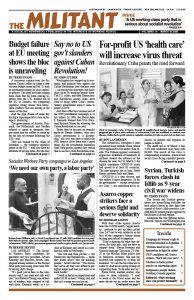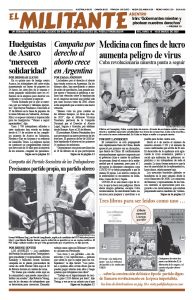A rancorous summit over the European Union’s effort to adopt a new six-year budget broke up Feb. 21 with no agreement among its rival capitalist powers. The deep divisions among them show that far from coming together after the U.K. walked out of the EU in January, the competing capitalist ruling classes face intractable conflicts that are tearing at the seams of the bloc.
And the pipe dream of some day having a superimperialist state in Europe is shattering.
The governments of Austria, Denmark, the Netherlands and Sweden refused to agree to demands they pay more into the coffers to make up for the loss of revenue following the U.K.’s exit.
They are backed by the rulers of Germany — the strongest capitalist power in the EU — who also have no intention of paying more. But the four northern governments can no longer count on backing from the British government, a former ally in their recurring fights over who pays for the ever-rising size of the EU budget.
The rulers of these wealthier nations begrudge demands from the rulers in weaker countries in eastern and southern Europe that want to continue receiving special subsidies, dubbed “cohesion funds” by EU bureaucrats, aimed at papering over inequalities between member states that have very different levels of industrial and economic development.
Though it’s far from being a state, the EU member nations have assembled a vast bureaucracy in Brussels that churns out rules and instructions it tries to impose on constituent governments. And it feasts upon a huge trough of cash.
But the bottom line is that from the beginning the EU was structured to benefit the ruling classes in Germany and, to a lesser degree, France — the two most powerful imperialist powers on the continent — at the expense of the others.
Last year a majority in the EU’s parliament forced through new rules allowing it to punish governments by withholding these “cohesion funds” if they don’t comply with the EU’s dictates. The move was adopted at the behest of Berlin and Paris, in order to strengthen the EU’s ability to discipline new governments elected in Hungary and Poland. EU bureaucrats claim that anti-EU ruling parties in both countries ran afoul of what they haughtily call the EU’s “core values,” by extending government control over their judicial systems.
As the dispute continues to simmer, EU officials are considering whether to ask their European Court of Justice to take action against the Polish government.
These attempts by the rulers of Germany and France to use the EU to impose their orders on different nations fuel the divisions rending the bloc. A European “union” among capitalist rivals that are sharply divided by cutthroat conflicts for markets and resources was always an illusion. But creating such a “union” and imposing its rules made conflicts that were never far from the surface more volatile — and had ruinous consequences for the working class.
The adoption of the common euro currency by many EU countries in 1999, supposedly to pave the way for unity and prosperity, gave the German rulers even greater clout over neighboring governments. For all practical purposes, the euro is the German mark under a new name.
Under the impact of the 2008 financial crash, Berlin and Paris accelerated their plunder of the weaker nations, hitting working people in Greece and Spain especially hard. They insisted the Greek government carry out assaults on workers and farmers as a condition for receiving new EU loans. The government obliged, slashing the minimum wage, imposing massive layoffs, cutting pensions and benefits and hiking sales taxes in the face of protests by working people. In 2018 EU bosses forced the Greek rulers to agree to restrictions on spending for 40 more years!
French President Emmanuel Macron berated those governments at the summit who opposed increasing the size of the EU budget, complaining, “It would be unacceptable to have a Europe that compensates for Britain leaving by scaling back its means.”
Macron says fund ‘EU army’
Initial budget proposals had included cuts to the EU’s military spending, which Macron wants to expand in order to create a European-wide army he dreams Paris will command.
For decades the rulers in Germany and other powers in Europe have sought protection under Washington’s nuclear umbrella and the massive military forces it deploys. They’ve let their own military forces languish, under the illusion they can compete with rivals around the world using just EU tariffs, with no serious military might to stand behind them.
The EU and its predecessors were founded as a trading bloc by weakened capitalist classes in Europe in the decades after the Second World War, when the U.S. emerged as the uncontested preeminent imperialist power.
As the EU expanded, many of the capitalist parties across the continent and beyond saw it as a model for a globalized world — in which different economies were increasingly integrated and interdependent, and national conflicts would be a thing of the past.
But in the real world of dog-eat-dog capitalism, where exploiting ruling classes are driven to compete with each other or go under, such harmonious relations can never be realized. Each ruling class uses its state power, including the armed forces, to press forward its interests against competitors. Today, with the prospect of a new economic slowdown and sharpening conflicts, so-called globalization is coming apart.
This fact is vividly reinforced by the crisis created for many bosses and their governments worldwide caused by the shutdown of production in China from the coronavirus outbreak there.


